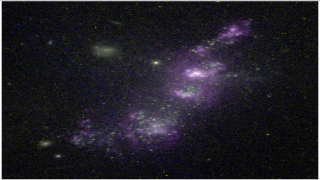Bibcode
Sánchez-Menguiano, Laura; Sánchez Almeida, Jorge; Muñoz-Tuñón, Casiana; Sánchez, Sebastián F.; Filho, Mercedes; Hwang, Hsiang-Chih; Drory, Niv
Referencia bibliográfica
The Astrophysical Journal, Volume 882, Issue 1, article id. 9, 17 pp. (2019).
Fecha de publicación:
9
2019
Revista
Número de citas
48
Número de citas referidas
45
Descripción
The role of gas accretion in galaxy evolution is still a matter of
debate. The presence of inflows of metal-poor gas that trigger star
formation bursts of low metallicity has been proposed as an explanation
for the local anticorrelation between star formation rate (SFR) and
gas-phase metallicity (Z g ) found in the literature. In the
present study, we show how the anticorrelation is also present as part
of a diversified range of behaviors for a sample of more than 700 nearby
spiral galaxies from the SDSS-IV MaNGA survey. We have characterized the
local relation between SFR and Z g after subtracting the
azimuthally averaged radial profiles of both quantities. Of the analyzed
galaxies, 60% display an SFR–Z g anticorrelation,
with the remaining 40% showing no correlation (19%) or positive
correlation (21%). Applying a random forest machine-learning algorithm,
we find that the slope of the correlation is mainly determined by the
average gas-phase metallicity of the galaxy. Galaxy mass, g ‑ r
colors, stellar age, and mass density seem to play a less significant
role. This result is supported by the performed second-order polynomial
regression analysis. Thus, the local SFR–Z g slope
varies with the average metallicity, with the more metal-poor galaxies
presenting the lowest slopes (i.e., the strongest SFR–Z g
anticorrelations), and reversing the relation for more metal-rich
systems. Our results suggest that external gas accretion fuels star
formation in metal-poor galaxies, whereas in metal-rich systems, the gas
comes from previous star formation episodes.
Proyectos relacionados

Grupo de Estudios de Formación Estelar GEFE
El proyecto interno GEFE está enmarcado en el proyecto coordinado, ESTALLIDOS, financiado por el plan nacional desde el año 2001. El ultimo proyecto aprobado es ESTALLIDOS 6.0 (AYA2016- 79724-C4-2-P). En el proyecto GEFE trabajamos en base al caso científico del proyecto ESTALLIDOS 6.0. Los estallidos de formación estelar (Starbursts o SB) son
Casiana
Muñoz Tuñón